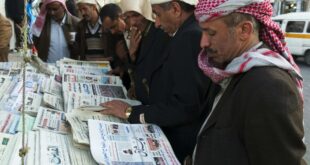Issue 32, summer/fall 2021 https://doi.org/10.70090/HME21WIA Scroll down for Arabic abstract. This study analyzes how a number of Arab newspapers approach water issues and the different perspectives they present about the water crises and water insecurity in the region. The paper examines the extent to which the framing of the topic …
Read More »The Role of Online Journalism in Shaping Knowledge and Attitudes of University Youth Towards Daesh’s Operations in Saudi Arabia: A Field Study (Arabic)
Issue 32, summer/fall 2021 https://doi.org/10.70090/ME21ROJS Scroll down for Arabic abstract. The study seeks to identify the role of online journalism in shaping the knowledge and attitudes of Saudi youth towards Islamic State of Iraq and Syria’s (Daesh) terrorist activities in the Kingdom of Saudi Arabia. The study used a sample …
Read More »Assessments of Controversial Representations of Religion and Religious Symbols as handled in the International Press: A Qualitative Study (Arabic)
Issue 32, summer/fall 2021 https://doi.org/10.70090/MSMS21RR Scroll down for Arabic abstract. This study uses qualitative methods to assess the analytical perspectives of the media elite; namely members of the academic and professional communities, as they relate to controversial representations of religion and religious symbols in the international press. Bearing in mind …
Read More »Peace Journalism: Egyptian Online Journalism’s Handling of January 2011 and June 2013 Revolutions (Arabic)
Issue 32, summer/fall 2021 https://doi.org/10.70090/KARS21PJ Scroll down for Arabic abstract. This study investigates how Egyptian online journalism handled the events of the January 2011 and June 2013 revolutions in Egypt, evaluating them from the perspective of peace journalism. The analysis was conducted using the following three criteria: The different ways …
Read More »Attitudes Toward the Role of Social Networks in Shaping Health Awareness during the COVID-19 Pandemic: An Actor-Network Theoretical Study of Egypt (Arabic)
Issue 31, winter/spring 2021 https://doi.org/10.70090/KSEH21SN Scroll down for Arabic abstract. Official statistics show that Egyptians, especially the youth, are increasingly using social networks. It is therefore important to examine the role these networks had in shaping the cognitions and attitudes of Egyptians towards the COVID-19 pandemic. The present study uses …
Read More »Debunking COVID-19 Fake News on Arabic Fact-Checking Websites: An Analytical Study (Arabic)
Issue 31, winter/spring 2021 https://doi.org/10.70090/SK21DC19 Scroll down for Arabic abstract. The COVID-19 pandemic has revealed an information crisis, labeled an “Infodemic”. This study explores the methodology of debunking fake news related to the pandemic on independent Arabic fact-checking websites. The study’s results are derived from a textual and visual analysis …
Read More »Pragmatics in Egyptian and Chinese Journalistic Discourse on Covid-19 Global Health Diplomacy: A Comparative Study and Proposed Preventive Geopolitics Perspective (Arabic)
Issue 31, winter/spring 2021 https://doi.org/10.70090/AA21PECJ Scroll down for Arabic abstract. This article attempts to use pragmatics for the analysis of opinion material on Youm7 and China Arabic websites. A sample survey from the period between January 1 and December 31, 2020 on global health diplomacy against COVID-19 has been conducted. …
Read More »An Analysis of Yemeni Online Journalism Discourse on the COVID-19 Pandemic (Arabic)
Issue 31, winter/spring 2021 https://doi.org/10.70090/AMSA21YO Scroll down for Arabic abstract. This study investigates how Yemeni online journalism has dealt with the COVID-19 pandemic. The study analyzes four of online news websites that represent the various political actors in Yemen. These websites include Al-Thawra Net (Sana’a and Riyadh editions), Al-Sahwa Net, …
Read More »Factors Influencing Public Attitudes toward Paid Online Newspaper Subscriptions- A Field Study (Arabic)
Issue 30, summer/fall 2020 https://doi.org/10.70090/EBD20FIP Scroll down for the Arabic abstract. Abstract Despite the implementation of new business models in several Western media organizations, most Arab newspapers have not yet explored these models, and little is known about public attitudes towards their willingness to pay for online news. The study …
Read More »Digital and Traditional Media’s Handling of Freedom Issues: A Comparative Study among Egyptian and Saudi Youth (Arabic)
Issue 30, summer/fall 2020 https://doi.org/10.70090/SEMA20SYA Scroll down for the Arabic abstract. Abstract With the expansion of the digital public sphere, tackling freedom issues has been widely transferred from traditional mass media to digital platforms. Based on the constructive approach that demonstrates the recipient’s active ability to give meaning to what …
Read More » Arab Media & Society The Arab Media Hub
Arab Media & Society The Arab Media Hub










